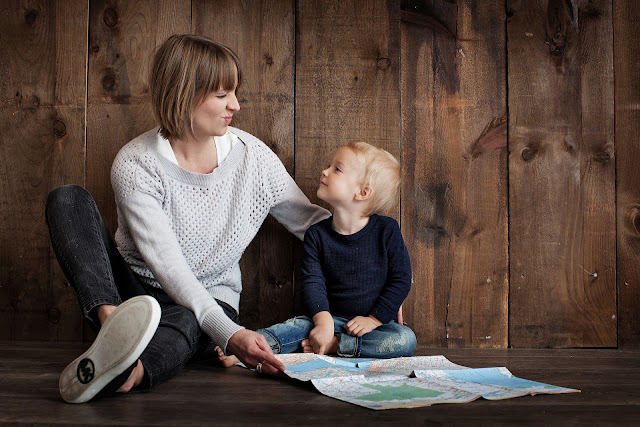Children Learn More From Who You Are
It takes a village to help your child grow into a
responsible, caring and poised adult, but it also takes a parent wiling to
learn and grow alongside their kid that ensures their success. There are
parenting books and classes that will give you insight into your child’s
development and others that may guide you on how to discipline your child. This
information can be quite useful and even vital to some, though at the heart of
every solid parent-child relationship lays a caregiver who is patient, loving
and willing to mature as their child develops.
There is a quote by W.E.B. Dubois, “Children learn more from
what you are than what you teach.” It is our role to lead children by example. They look to us for security, to
learn how to regulate their emotions and how to treat others. And there is not one parent I
have met who does not feel like at one time or another they are falling short. This
insecurity and vulnerability is a key part of the growing process. I call this
the, “now it’s time to do something different,” phase of parenting, when
the change really starts to unfold.
Let Go of Self-Judgment
Do you ever
feel self-conscious at any point in your day? Sure, we all do to some extent.
Does my boss think I am not pulling my weight? Do people think I am too
permissive as a parent? The most important thing to understand in these
situations is that worrying is what fuels anxiety, fear and self-judgment. All
the energy and thought we put into worrying will not change anything. We must
strive to assess how well a job we feel we are doing at work or while parenting
and let that be enough. When we let go of self-judgment we show our children
firsthand how to release toxic thoughts and accept things as they are.
Acceptance
Acceptance is a huge part of making a positive change in
parenting. Say you are having a stressful day and your child decides to pour a
cup of milk all over the table. In the state you are in, your first
reaction may be to screech at the top of your lungs at your child and send
them to their room. Later you might feel terrible about how you handled the
situation. Yes, pouring milk onto a table is not cool; however unloading
your frustration onto your child while you are already upset is not much better. The root of your guilt may lay in recognizing that your anger came from a much deeper place than the one you were experiencing in the present moment. The best approach in this scenario is to allow
yourself to truly see what a bad day you are having and to cut yourself some slack. Taking a moment to stop and say, “I was having a bad day and even though I try my best as a parent, sometimes I am pushed to my limit and succumb to weakness,”
will help a great deal. This space gives both you and your child some breathing room. The next step is to calmly approach your child and
admit that you wish you could have handled the situation in a more skillful
way, then check in with them. See why they chose to act out. Perhaps
something happened at school, etc. When we admit our faults we let our children
see that we are simply human and it is okay to make mistakes. Admitting you are
wrong takes courage and your child will appreciate and learn how to do the
same.
Connection with Others
Feeling connected to others is so important in parenting.
There is not one person who has ever said that parenting was easy. It takes
love, support, perseverance and patience. Having close friends to express your concerns
to helps immensely. This also shows your children how essential accepting and
giving support is and the importance of friendship.
Gratitude
Expressing gratitude will not only help others feel
appreciated, it may also improve your mood as well. When you let someone know
how much you value them, it releases oxytocin, a hormone that is linked to the mother-child bond, falling in love and friendship. Studies have also concluded that
gratitude decreases negative moods and depression, and is associated with positive
emotions and better sleep. Gratitude is simply a way of being that is
contagious and when you are grateful you plant the seeds of gratitude in your
kids.
References
Brach, T. (2003). Radical Acceptance: Embracing Your Life
With The Heart of a Buddha. New York, NY: Bantam Dell, A Division of Random
House, Inc.
Emmons, R.A. (2007). THANKS! How the New Science of
Gratitude Can Make You Happier. Boston, MA: Houghton-Mifflin.
Shapiro, S. & White, C. (2014). Mindful Discipline: A
Loving Approach to Setting Limits and Raising an Emotionally Intelligent Child.
New Harbinger Publications, Inc.









The first thing I'd like to say is, your blog posts have been a supportive voice in helping me parent better. I cannot thank you enough for posting such insightful topics. Learning to accept the lifelong process of being a good parent and trusting that my heart and instinct can help guide my way has been a huge eye opener for me. Both me and my kid have you to thank when things get a little crazy around here.
ReplyDeleteLynn
What a wonderful thing to hear. Knowing that makes me feel so fulfilled and grateful that the Internet can be a solid source for support and that I can be a part of it. Hope to have you stop back again and again.
Delete